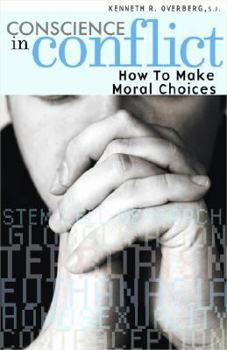Conscience in Conflict: How to Make Moral Choices
Select Format
Select Condition 
Book Overview
""What ought we to do?"" In this third edition of Conscience and Conflict: How to Make Moral Choices, Jesuit theologian Kenneth Overberg discusses the sex abuse scandal in the Catholic church,... This description may be from another edition of this product.
Format:Paperback
Language:English
ISBN:0867167238
ISBN13:9780867167238
Release Date:January 2006
Publisher:Franciscan Media
Length:176 Pages
Weight:0.60 lbs.
Dimensions:0.5" x 5.5" x 8.5"
Customer Reviews
3 ratings
Good book on making moral choices
Published by Thriftbooks.com User , 17 years ago
I read this book as part of my formation to be ordained as a Permanent Deacon. Overall I enjoyed the book. The first section of the book lays a lot of heavy background, and was at times a little difficult to get through. The auther is dealing with a tough subject and the background was worth it when you get to the later sections of the book dealing with more specific issues. The later sections were easier reads, even though they were dealing with some tough moral issues. As an introduction to moral theology I would recommend this book.
A guide for discussion and consideration
Published by Thriftbooks.com User , 18 years ago
Author Kenneth Overberg sets forth his primary assumptions very early in this book by stating, 'Deeply rooted in the Catholic tradition is the conviction that morality is based on reality. Reality is God, human being and the rest of creation--all in relationship. Every moral dilemma presents a small but real slice of this totality.' Overberg draws heavily on the publication in the 1990s of the official Catechism of the Catholic Church and encyclicals such as The Splendor of Truth and The Gospel of Life in this third edition. While this book is written primarily with a Roman Catholic readership in mind (particularly for RCIA classes and other parish-based study groups), it can be used beneficially by Christians of any denomination. Indeed, it might well be suited for Anglican via-media Christians, given Overberg's emphasis of a discernment method that 'rejects the extremes of blind obedience and relativism.' The book is essentially broken into two parts. The first part develops the tools of the trade--asking the right questions in the right way, understanding who we are in the first place, and understanding our context as individuals who live in community are key issues. Overberg seeks a process that works when the answers are not binary options, but rather allow for middle ground. He also replaces the word 'should' with the word 'ought,' symbolic of authentic obligation rather than a socially-expected requirement. Of course, all of this working is contingent on the kind of people we are and see ourselves as being, which requires an understanding of the meaning of human life. The second part then uses these tools to look at three broad categories of issues: topics related to sexual morality (contraception, abortion, homosexuality all get tied together); medical topics (stem-cell research, euthanasia and life-support cessation issues, AIDS, the availability or lack thereof of medical treatment); and social ethics (globalism, war, economic justice). Overberg does not suggest definitive answers, and often not even tentative answers of his own, but rather in each instance repeats the official church teaching, the history of that teaching, where others within and outside the church have disagreed, and what the salient issues and genuine areas of honest disagreement may be. 'Merely repeating a teaching that has been seriously and respectfully questioned does not lead to the same kind of confidence,' Overberg states, as the kind of conversation and analysis that might lead to a fuller understanding, which might 'lead to change or to reaffirmation.' He applies the criteria from the first section specifically to the issues in the second. Overberg does not have an agenda to push, other than to prompt people to be more deliberate in their approach to moral decisions. In my seminary, one of the primary tasks of the introductory theology class was to distinguish between embedded theology and deliberative theology--that kind of theology th
Helpful Insights for Making Difficult Choices
Published by Thriftbooks.com User , 19 years ago
Fr. Overberg, a professor of theology at Xavier University, presents the third edition of this book, which first appeared in 1991 and was updated in 1998. Throughout, he stresses the difficult work that goes into making honest ethical decisions and the potential for our choices to "build up or destroy our personal communal humanity." The first three chapters address foundations of contemporary Catholic morality, the process of making moral decisions, and the question of infallibility. The final three chapters are devoted to sexual, medical, and social ethics. Each topic, from homosexuality to globalization, is considered in light of Church teaching, current debate, and legal considerations. The section on medical ethics covers stem cell research, cloning, HIV/Aids, and end-of-life issues. Overberg's treatment of "extraordinary" measures for preserving life, an issue likely to touch many of us, demonstrates the complexity of making moral choices in the face of conflicting information and confusing vocabulary. Time and again, Fr. Overberg emphasizes the complications involved in an honest search for truth, stressing that ethical decisions are rarely black or white and "Law and authority play significant roles, but do not necessarily ease the complexity of contemporary morality." Though no easy answers are provided, each chapter ends with questions that encourage us to take seriously our obligation to exercise the three dimensions of conscience: desiring to do the right thing, diligently searching a variety of sources for wisdom and guidance, and making a specific judgment.






